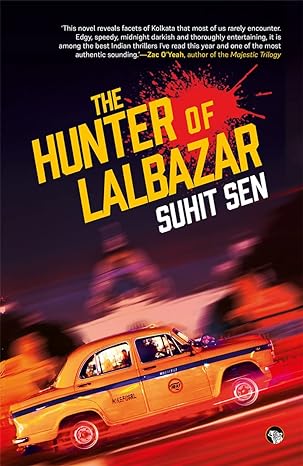Samiksha Ransom reviews Suhit Sen’s The Hunter of Lalbazaar recommending it as your next weekend crime fiction read.
The Hunter of Lalbazar is a crime thriller by Suhit Sen that echoes the Indian crime thriller film, except for the fact that, unlike major crime films, this book chooses the investigation to be led by a female cop – JCP Tanya Samanta. An honest, sensitive, and conscientious cop who is also an able leader, Tanya Samanta is on the chase of a serial rapist whose degree and extent of crime increase proportionally to the number of his victims. The reader is left wondering if this criminal were to commit the next crime, what would be the consequences for the victim, in addition to rape? Which woman would next fall prey to this taxi-driver cum rapist?
When Tanya is informed of the first rape, she is determined to catch him and put him behind bars. Little does she know that this man might not necessarily be running away from her. In a way, he too wants to be ‘caught’ by Tanya because of his obsessive need to get his revenge on her. Often while committing his crimes, he imagines his victim as Tanya. Why does this criminal obsess over Tanya and long for revenge? What is the relationship the two have shared? Is he one of her own?
We encourage you to buy books from a local bookstore. If that is not possible, please use the links on the page and support us. Thank you.
Twists and Turns
What Tanya does know, however, is that, unlike most criminals, he is unrelenting and makes no attempts to hide his crimes. On the contrary, he often dumps his victims in public spaces like parks and leaves their wallets on the crime scene for easy identification by the police. Deeply craving the attention, he gets from the police, media, and society, he commits one crime after another, and while the chase continues, he continually manages to evade Tanya and her team – in one incident, literally slipping from under their noses.
Though he always manages to slip out of her hands, because he is obsessed with Tanya, and Tanya’s determination to catch him, an ultimate showdown is inevitable between the two. The only question that remains, and will make all the difference is this – who will catch whom first?
The novel is set in the city of Kolkata and is meticulous in its description of the city – its places, people, and culture. It is divided into six parts, each set at a different location in the city. Though the first part of the novel is relatively slow, the second part picks up the pace as the account shifts into the present tense and instantly becomes more engaging. As the narrative picks up, the reader begins to understand that the stakes are raised higher and higher, with every minute this man spends on the loose.
Enjoy reading thrillers? You will love reading this post-pandemic fiction.
Suhit Sen’s Voice and Narrative
However, there is one drawback – the voice of Suhit Sen seems to seep into the narrative now and then and take precedence over the voice of the characters. Sometimes minor details are narrated, even though the reader might deem them insignificant to the narrative. Despite this, parts five and six, where most of the action happens, are particularly engaging.
The Hunter of Lalbazar takes a socially conscious approach. Suhit Sen writes from a feminist perspective – Tanya Samanta is only one of the good and capable female cops, while there are many others like her on her team, and many with whom she collaborates to catch the culprit. Ghazala, a courageous young girl can fend off the criminal and injure him. The other victims too, decide to collectivise, share their experiences, and learn the art of self-defense at Ghazala’s bidding.
Throughout the novel, Suhit Sen also does not hesitate to comment on the corruption of politicians and officers in the police department itself, which are themes critical to the book. Well-researched, the book gives the reader interesting insights into the city of Kolkata and various police procedures that the layman might be unaware of. While certain aspects of the book can be improved, it is an appealing read for an audience that loves to taste the thrill of Indian crime fiction.

Favourite Quote
In Calcutta, as in other Indian cities, there are slums and then there are slums. Some are somewhat habitable, but not the ones along the railway lines, which are makeshift hellholes. A universal fixture of these slums is the hooch den. It is to a slum what a temple is to a village, or a tea shop to a city neighbourhood. Here, the denizens gather to get hammered, discourse, complain, and often quarrel and fight. If they are unlucky, and the ethanol they are supposed to be drinking turns out to be methanol, they die or go blind.
Have you read this chilling novel based on the police procedurals in India? What do you think of it? Drop a comment below and let us know!






















